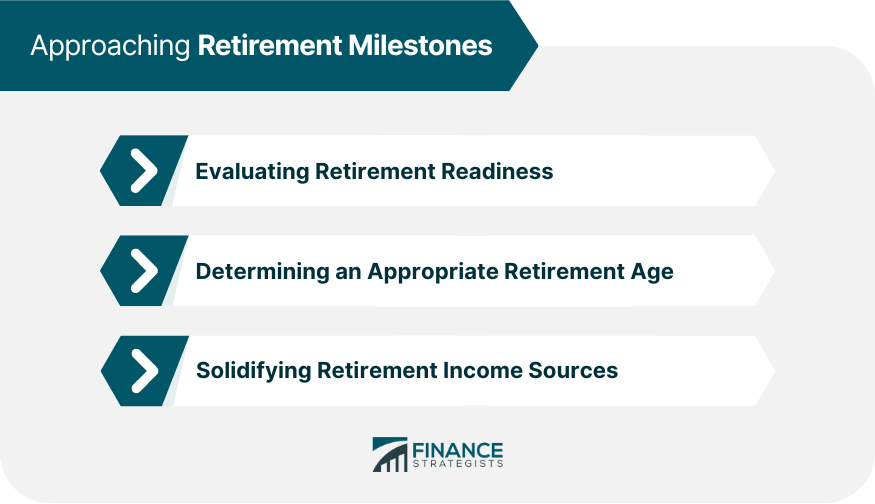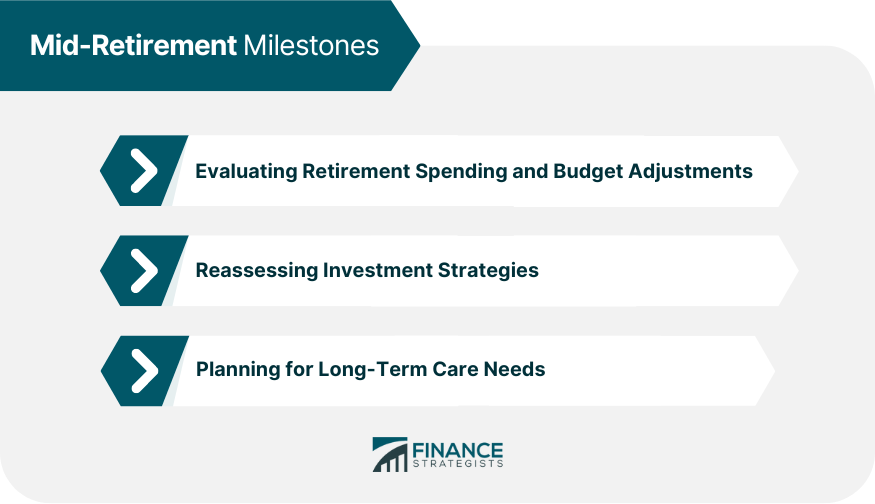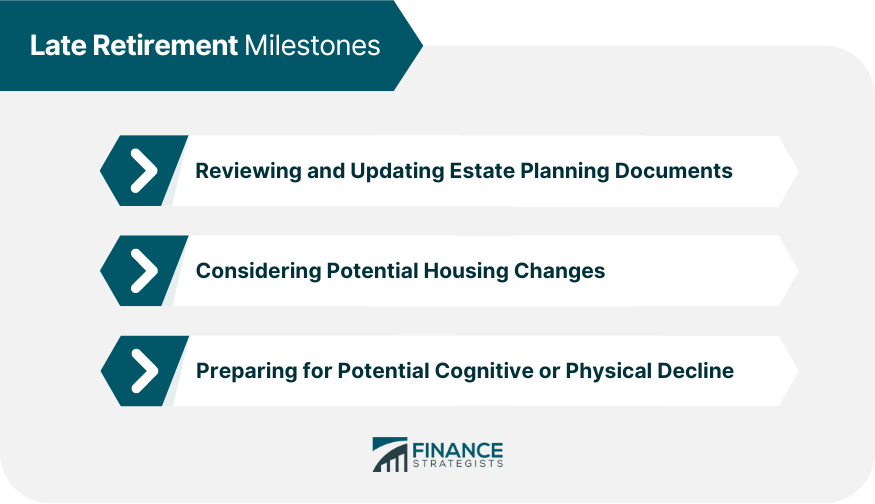Retirement milestones refer to significant events or accomplishments during the retirement planning process or in retirement itself. These milestones can be financial, personal, or social in nature and may vary depending on an individual's unique circumstances and goals. Recognizing and planning for retirement milestones can help individuals create a more secure and fulfilling retirement experience. By using these milestones as a guide, individuals can navigate various stages of their careers and retirement years with greater confidence and financial stability. Retirement milestones serve as a framework for retirement planning, allowing individuals to track their progress and make necessary adjustments to their financial strategies. This approach can help ensure a more successful and satisfying retirement. One of the first retirement milestones to achieve is starting a retirement savings plan. This can involve enrolling in an employer-sponsored retirement plan, such as a 401(k), or opening an individual retirement account (IRA). Establishing a savings plan early in one's career can help maximize the benefits of compound interest and create a solid foundation for future financial security. In addition to starting a retirement savings plan, early career milestones should also include developing a long-term financial plan. This plan should outline specific retirement goals, savings strategies, and investment approaches to help guide financial decisions throughout one's career. Creating an emergency fund is another important early career milestone. An emergency fund can provide a financial safety net for unexpected expenses, such as job loss or medical emergencies, helping to protect retirement savings from being depleted. As individuals progress in their careers and experience changes in their personal and financial circumstances, it is essential to reevaluate retirement savings goals. This may involve adjusting savings rates, investment strategies, or retirement timelines to ensure that financial plans remain on track. During the mid-career stage, individuals may face competing financial priorities, such as saving for a child's college education or paying off a mortgage. It is essential to balance these priorities while continuing to save for retirement, ensuring that long-term financial security remains a focus. As income levels rise during the mid-career stage, individuals should consider increasing their retirement plan contributions. This can help to accelerate retirement savings growth and take advantage of any available employer matching contributions. During the late career stage, individuals should maximize their savings by contributing as much as possible to their retirement accounts and taking advantage of catch-up contributions if eligible. This can help ensure that individuals are well-prepared for their impending retirement. As retirement approaches, individuals should begin to prepare for the transition by evaluating their readiness, determining an appropriate retirement age, and solidifying their retirement income sources. This may also involve adjusting investment strategies to reduce risk and protect savings. Late-career milestones should also include considering healthcare needs and options during retirement. This can involve exploring Medicare, supplemental insurance plans, and long-term care insurance to ensure that healthcare expenses are adequately covered. As retirement nears, individuals should evaluate their retirement readiness by assessing their financial resources, lifestyle goals, and potential expenses. This can help determine whether additional savings or adjustments to retirement plans are necessary. Choosing an appropriate retirement age is a critical milestone in the retirement planning process. Factors to consider include financial readiness, Social Security benefits, and personal health and lifestyle preferences. Before entering retirement, individuals should solidify their income sources, such as pensions, Social Security benefits, and investment income. This can help ensure a stable and reliable income stream during retirement, providing peace of mind and financial security. During the early stage, individuals should initiate their retirement income streams, which may include withdrawals from 401(k)s or IRAs, pension payments, and Social Security benefits. Proper planning and management of these income sources are essential to maintain financial stability throughout retirement. Adjusting to a new lifestyle and budget is another critical early retirement milestone. Individuals should develop a retirement budget that aligns with their income sources and desired lifestyle, allowing them to enjoy their retirement years without financial stress. Early retirement is an ideal time for individuals to pursue their desired activities, whether it be travel, hobbies, or spending time with loved ones. By engaging in meaningful activities, retirees can enhance their overall well-being and life satisfaction. During mid-retirement, individuals should evaluate their spending patterns and consider any necessary budget adjustments. This may involve reducing expenses, modifying investment strategies, or exploring additional income-generating opportunities to ensure financial stability. Mid-retirement is also an opportune time to reassess investment strategies to ensure they align with current financial needs and goals. This may involve adjusting asset allocations, considering annuities or other income-generating investments, or seeking professional financial advice. Planning for potential long-term care needs is a critical mid-retirement milestone. This can involve researching long-term care insurance options, exploring potential care facilities, or discussing preferences and plans with loved ones. Late retirement is an ideal time to review and update estate planning documents, ensuring that assets are distributed according to the retiree's wishes and in a tax-efficient manner. This can help alleviate potential conflicts and misunderstandings among loved ones. As individuals age, they may need to consider potential housing changes to accommodate their changing needs and preferences. This may involve downsizing to a smaller home, moving to a retirement community, or exploring assisted living facilities. Preparing for potential cognitive or physical decline is an essential late retirement milestone. This can involve developing a plan for healthcare needs, appointing a durable power of attorney, and ensuring that loved ones know the individual's wishes and preferences. Retirement milestones serve as a roadmap for successful retirement planning, helping individuals navigate their careers and retirement years with greater confidence and financial stability. By recognizing and addressing these milestones, individuals can create a more secure and fulfilling retirement experience. Throughout retirement, individuals may encounter various changes and challenges that require adjustments to their financial strategies and lifestyle plans. By continuously reviewing and adapting their retirement plans, retirees can better navigate these challenges and maintain a fulfilling and financially secure retirement. By planning for and addressing key retirement milestones, individuals can achieve a fulfilling and financially secure retirement. This involves careful consideration of savings goals, investment strategies, healthcare needs, and lifestyle preferences, as well as ongoing adjustments to adapt to changing circumstances and needs.What Are Retirement Milestones?
Early Career Milestones
Starting a Retirement Savings Plan
Developing a Long-Term Financial Plan
Establishing an Emergency Fund
Mid-Career Milestones
Reevaluating Retirement Savings Goals
Balancing Competing Financial Priorities
Increasing Retirement Plan Contributions
Late Career Milestones
Maximizing Retirement Savings
Preparing for the Transition to Retirement
Considering Healthcare Needs and Options
Approaching Retirement Milestones
Evaluating Retirement Readiness
Determining an Appropriate Retirement Age
Solidifying Retirement Income Sources

Early Retirement Milestones
Initiating Retirement Income Streams
Adjusting to a New Lifestyle and Budget
Pursuing Desired Retirement Activities
Mid-Retirement Milestones
Evaluating Retirement Spending and Budget Adjustments
Reassessing Investment Strategies
Planning for Long-Term Care Needs

Late Retirement Milestones
Reviewing and Updating Estate Planning Documents
Considering Potential Housing Changes
Preparing for Potential Cognitive or Physical Decline

Conclusion
The Significance of Retirement Milestones in Retirement Planning
Adapting to Changes and Challenges During Retirement
Achieving a Fulfilling and Financially Secure Retirement
Retirement Milestones FAQs
Common retirement milestones include reaching a certain age, such as 65 or the age at which full Social Security benefits become available, or achieving a certain level of retirement savings.
Retirement milestones are important because they provide a sense of progress and achievement in retirement planning. They can also serve as a reminder to take important actions, such as signing up for Medicare or starting required minimum distributions from retirement accounts.
Important financial retirement milestones include reaching a certain level of retirement savings, such as one million dollars, and starting to withdraw retirement savings, either through required minimum distributions or other withdrawal strategies.
Important health-related retirement milestones include signing up for Medicare, reviewing health insurance coverage, and establishing a plan for long-term care.
Yes, retirement milestones can differ for individuals depending on their personal circumstances, goals, and timelines. For example, someone who plans to retire early may have different milestones than someone who plans to work until a later age.
True Tamplin is a published author, public speaker, CEO of UpDigital, and founder of Finance Strategists.
True is a Certified Educator in Personal Finance (CEPF®), author of The Handy Financial Ratios Guide, a member of the Society for Advancing Business Editing and Writing, contributes to his financial education site, Finance Strategists, and has spoken to various financial communities such as the CFA Institute, as well as university students like his Alma mater, Biola University, where he received a bachelor of science in business and data analytics.
To learn more about True, visit his personal website or view his author profiles on Amazon, Nasdaq and Forbes.











